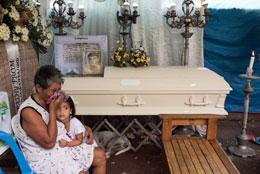Children suffer in Duterte’s war on drugs

In a hovel near the mountain of trash in Metro Manila’s Quezon City known as Payatas, “Jennifer” stared longingly at the blue couch that had been her father’s favorite spot.
Her father, “Benigno Mercado,” was on the couch when police shot him dead during a drug sweep of the neighborhood in December 2016. The police claim Mercado was a drug dealer and resisted arrest.
Jennifer has a different version. She said that about seven men in civilian clothes barged into their small home that day, looking for Mercado. The men ordered everybody out. But Jennifer clung to her father, hugging him as he sat on the sofa and held up his work ID for the cops to see.
“He was told to lie face down but he held his ID up behind him. All the while, one of the men had a gun to his head,” Jennifer recalls. Mercado kept begging. “Sir, if I committed a crime, please have mercy, please don’t kill me. If you want, you can just detain me. Because of my poor children, they are seven. What happens to them, who will take care of them?” a crying Mercado told the men, according to Jennifer’s mother “Belinda.” Jennifer said she tried to shield her father by hugging him, and covering him with her small body.
One of the men – “the big one,” she said – grabbed Jennifer, who was 11 at the time, and threw her to the floor just outside the door of the living room. One of her siblings caught her, breaking her fall onto the dirty concrete floor. The men ordered everyone but Mercado to leave the house; on her way out, Jennifer saw her father continue to beg for his life. Moments later, when Jennifer and all the others were in the small alley outside the house, three gunshots rang out.
Uniformed police officers arrived minutes later; the men in civilian clothes were still inside the Mercado home. When the medics came, Jennifer strained to look inside and saw blood all over the floor, her father now lying face up beside the couch. “That’s when I saw the gun beside his hand,” Jennifer said. She swore her father did not have a gun, that she never saw one in their home. Police say they shot him because he fought back. The cops claim they found a sachet of shabu, Filipino slang for methamphetamine or crystal meth, on Mercado’s body.
Witnessing what happened to her father was traumatic enough for Jennifer and her family. But the consequence of his death only added to their suffering. They lost their breadwinner – Mercado worked in a junk shop in another district of Manila and was only home the day he was killed because it was the birthday of another daughter, “Amy.” Since his death, there have been days the children have had nothing to eat. They rely mainly on the generosity of their grandmother, who agreed to take care of them.
Jennifer’s mother was in jail for a drug-related case at the time of the killing but has since reunited with her children. After a TV station interviewed Jennifer, exposing her identity in the process, classmates began bullying her in school, ridiculing her for her father’s alleged drug use, which she denied.
Jennifer still grapples with the trauma of her father’s death. There were days when the grief was so unbearable she didn’t know what to do. She became withdrawn, not just because of the bullying but also because she just wanted to keep her head down. She finds comfort in the company of her siblings, staying mostly inside their ramshackle home, their giggles – and tears – drowned out by the noise of a malfunctioning electric fan.
“Jennifer’s” story is just one of many on a new web feature by Human Rights Watch to bring attention to the children being impacted by the Philippine government’s brutal “war on drugs”.
It follows a resolution initiated by Iceland that asks the UN Office of the High Commissioner for Human Rights to report on the Philippines’ “drug war” and human rights crisis.
“No child should experience the loss of a parent or other family member to extrajudicial killings or witness such horrific violence at the hands of police or hitmen,” said Carlos Conde, Philippines researcher. “The toll of the Philippines’ ‘drug war’ does not end with the killing of a drug suspect, but may extend to their children, often completely destroying families.”
By the government’s own admission, more than 6,600 people have been killed since the “drug war” began after Duterte’s election three years ago.
Other estimates are much higher. Children have been among those who died during police operations, either directly targeted or inadvertently shot by the police.
“The tragic stories of children victimized by the Philippines’ ‘drug war’ should energize the UN Human Rights Council to bolster efforts to put an end to the killings,” Conde said. “The Philippine government needs to be held accountable for the suffering of these children.”






